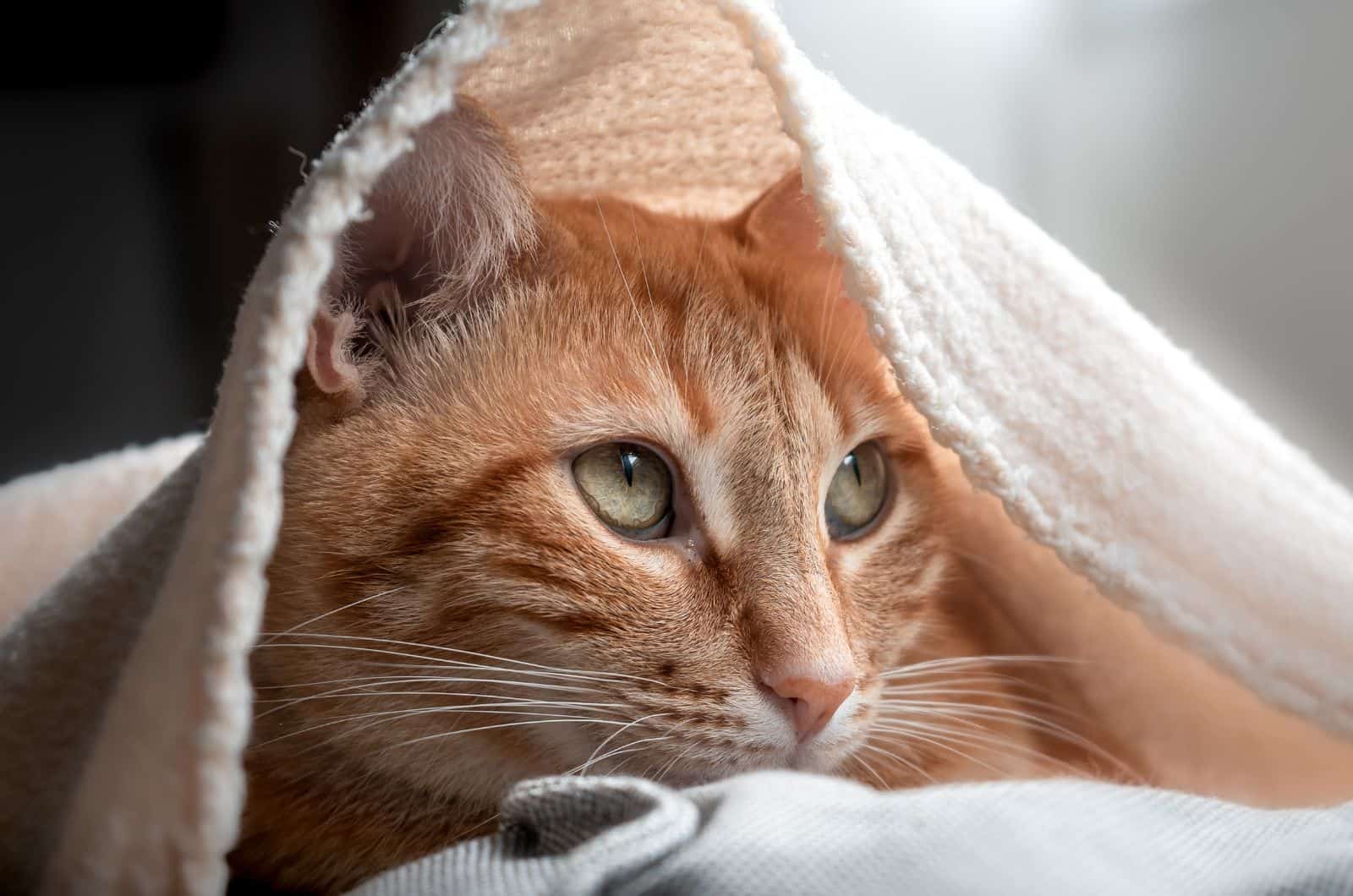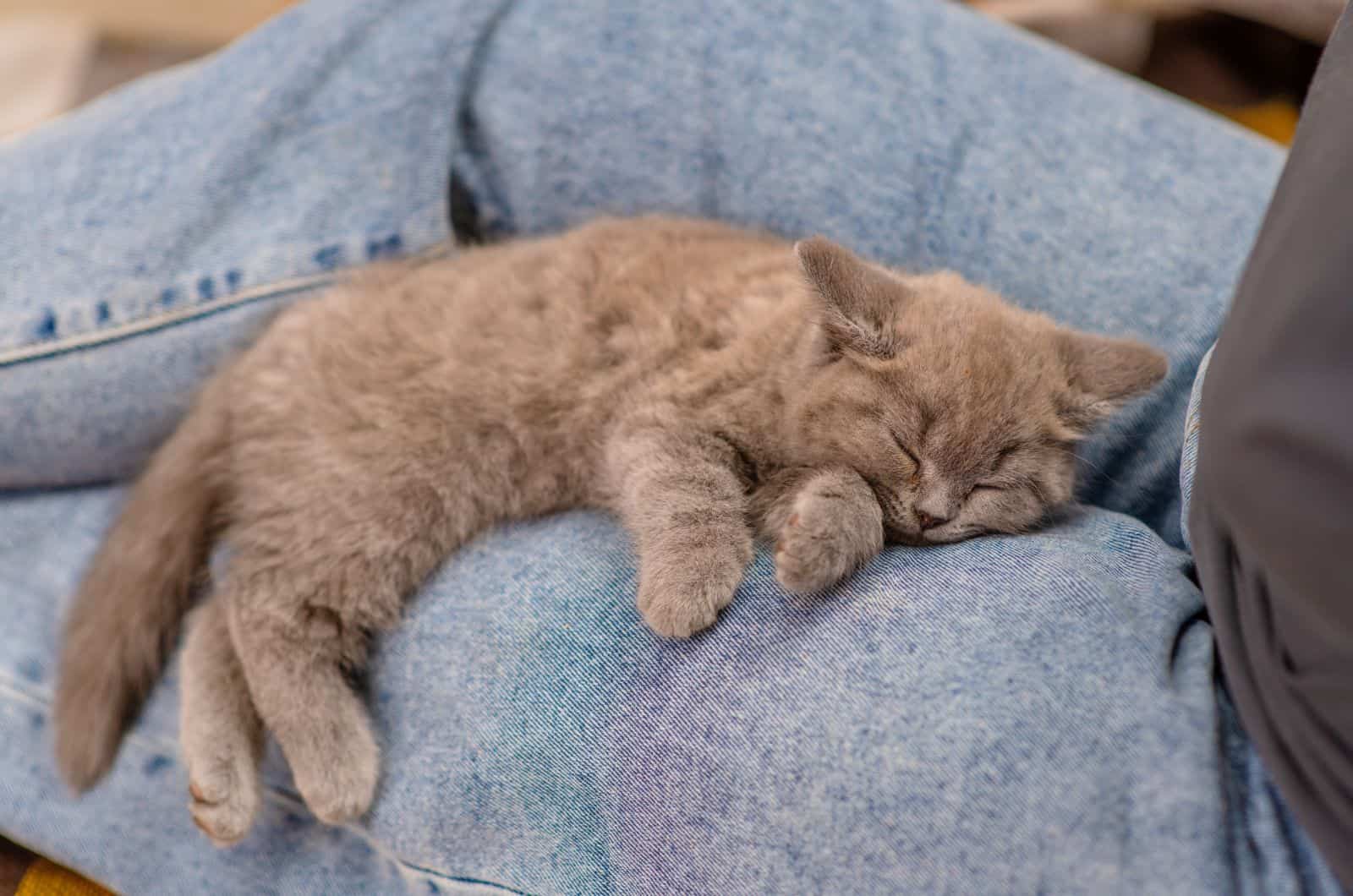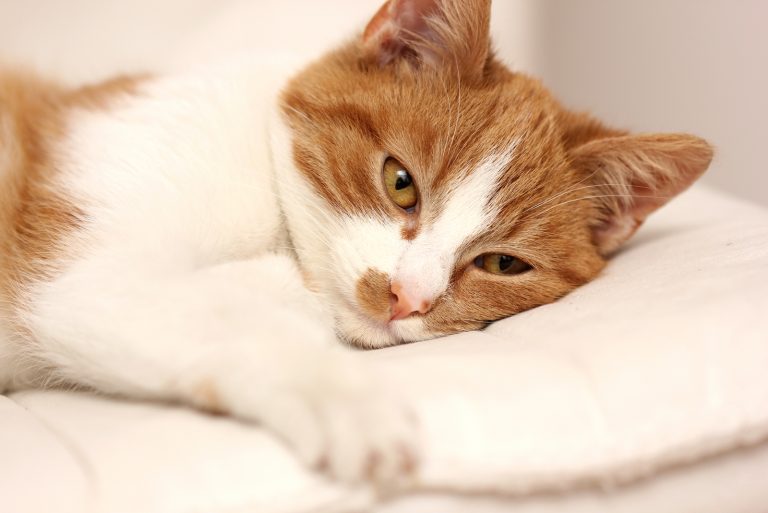Should I Quarantine My Cat With Tapeworms? Find Out NOW!

Almost every cat will get a worm infection at some point in their life. Worms are a very common affliction for cats.
No matter how careful you are, sometimes a tapeworm infection is inevitable. It’s best to face the problem head on and treat it and then take precautions to prevent further infection.
Every pet’s health is important, which is why it’s very important to know more about tapeworms and tapeworm infection in cats.
So, read on to find out the answers to the following questions: Should I quarantine my cat with tapeworms? How does a cat get infected with a tapeworm? What are the symptoms of a tapeworm infection? Learn all about deworming, and everything else you need to know.
Get comfortable and read on to learn more about the world of cats and how to care for them!
Should I Quarantine My Cat With Tapeworms?

My cat has worms, HELP!
If you’re a pet owner dealing with this problem for the first time, then you might be pretty horrified at the thought of worms. Keep reading to see what you can do to help your kitty friend!
A cat that is infected with tapeworms is a danger to cats and other pets. That’s why it’s important to quarantine the cat for a few days, while undergoing proper deworming treatment and care.
It’s important that you notice the very first symptoms of a tapeworm infection so that you can react in good time. If you don’t, things may get even more complicated.
It is a good idea to provide your feline friend with a dewormer every once in a while as a preventive measure, because an infected cat also puts you, your home, your other family members, and other pets at risk.
If you want to be a responsible owner, it’s important you know about tapeworms. This will help you answer our main question; Should I quarantine my cat with tapeworms?
How Does A Cat Get Infected With Tapeworms?
If you have wondered how cats get tapeworms, then this is what you need to know…
Cats can easily get infected with tapeworms. They can get them from their prey, fleas, mother’s milk, from an infected animal’s poop, and from larvae.
Outdoor cats are more prone to getting infected with worms, and therefore their owners should be more mindful of the problem, and take their feline to regular vet-checks. Even though indoor cats are at less risk, they still need preventative medication.
There are many different ways that cats can get infected. So, for example an infected cat spreads small worm eggs while defecating. These worm eggs may continue being in your environment for a long time.
If another cat accidentally consumes these eggs, it will get infected. For example, if the cat is walking around the infected area and then starts grooming itself, it may ingest the eggs and become infected.
Where Do Tapeworms Come From?
Tapeworms are the most common type of worm that a cat can get infected with, although there are other types of worms as well.
Usually, fleas are the main culprits because they may contain the larvae form of the worm. Therefore, when a cat grooms itself, it ingests the flea larvae and becomes infected.
These larvae may infect other small animals that cats like to hunt and eat for dinner. If your feline catches infected prey, it can easily get infected too.
If you have a cat who’s about to have kittens, pay special attention, because if the mother cat is infected, it can easily pass the worm larvae to the kittens through the milk.
Kittens may get infected, which may lead to various symptoms such as diarrhea, weight loss, vomiting, and similar. Unfortunately, their immune systems aren’t strong enough to fight this.
This is why it’s so important to ensure your cat goes through the deworming process so that you’re totally sure they’re safe.
CHECK OUT: Cat Suddenly Lethargic And Weak – Causes & Treatment Options
The Symptoms Of A Cat Infected With Tapeworms

At the very early stage of infection, healthy and strong cats won’t really show any obvious symptoms of parasitic infection.
However, if it’s a kitten or an older cat that we’re talking about, they may start showing symptoms sooner as their immune system may struggle to fight the problem.
However, if you don’t notice the symptoms early enough, the worm situation may get more complicated. So, as soon as you notice any symptoms or side-effects, you should consult with your vet.
Symptoms include:
• A cat vomiting, but acting fine
• A cat having diarrhea
• A cat being lethargic and weak
• Digestive issues
• Disbalanced appetite, but extreme weight loss.
Are Tapeworms Bad For Felines?
In order to answer the question – Are tapeworms bad for felines, first we need to find out what is a tapeworm.
Tapeworms are intestinal parasites. They have a hook-shaped mouth which helps them to latch onto the walls of the intestine.
Once they attach themselves to the small intestines, they continue to grow, taking nutrition from the cat. Adult worms may reach as much as 30 cm in length.
There are two most common types of tapeworms found in cats and they are called taenia taeniaeformis and dipylidium caninum.
The first type is usually found in rats and mice, and a cat may get infected by eating them. The second type is usually carried by infected fleas.
That means that in most cases, cats that have fleas will also get infected with tapeworms. This usually happens after a cat accidentally ingests a flea while grooming herself.
After ingesting a flea, the tapeworm larvae releases itself from the flea during the digestion process and attaches itself to the intestinal walls.
Other animals may get infected, usually through the cat’s feces. When a cat’s tapeworms grow enough, they start to break off in segments and are expelled with the feces.
The feces of an infected cat will contain these segments called proglottids, and each one of the segments looks just like a grain of rice but contains at least 20 worm eggs! This is also how they spread in your environment.
Are Tapeworms Harmful?!
Tapeworms are bad for cats and for your environment too, because these tapeworm segments can be stuck around the cat’s anus and spread around.
An infected cat is dangerous for other pets and people too because the infection is very easily transmitted.
In addition to that, it affects the cat’s body and can lead to negative consequences. If you want your feline friend to be happy and healthy, then you should pay attention to how you can protect your cat.
What To Do If Your Cat Is Infected With Tapeworms?

If you notice some of the symptoms of tapeworms, there’s a high likelihood that your cat has worms.
In this case, the best thing you can do is to quarantine your feline friend for a few days and start the deworming process as it’s highly important for your cat, other pets that you may have, and also for you and your environment.
Keeping your cat in one space prevents tapeworm segments from spreading around your home, or infecting other pets if you have any.
Now, let’s see what you should do with an infected cat and why it is so important!
Your Feline Should Visit The Vet
If you suspect that your furry friend has worms, you should take her to the vet for a check-up. If the vet confirms that it’s tapeworms, they’ll prescribe a dewormer medication formulated to treat tapeworm infection.
These medications refer to anti-parasitic medication that detach the worm from the cat’s intestine. So, dewormers work in a way that they detach the worms from the intestine, and both worms and their eggs get out along with the cat’s feces.
Whether a medication will work or not depends on the severity of the infection and the effectiveness of the medication. Some deworming meds are stronger than others, but your vet will decide which is the best choice for your individual pet. Normally, a good worming medication removes worms within 24 hours of taking the medication.
Furthermore, if the cat has been infected for a long time, it may require another dose of dewormer after a few weeks. In these cases, your kitty should be quarantined for at least 3-4 weeks.
The main types of deworming medications are benzimidazoles, prazion-isoquinolines, macrocyclic lactones, and tetrahydropyrimidines. However, here’s a reminder: Don’t use anything on your own; always consult with your vet first.
It’s better to follow the vet’s instructions as they know what’s best for our beloved pets.
Additionally, you can always provide your feline with a dewormer medication preventively, if your vet agrees. This way, you’re keeping your cat, and other pets, safe, as well as protecting you and your environment.
At-Home Deworming
In case you don’t want to give medications to your feline, there are a few at-home deworming options that may be useful.
This option is for those who prefer a natural approach to solving health problems. Some of the best natural dewormers include chamomile, carrots, raw pumpkin seeds, coconut oil, turmeric, and apple cider vinegar.
While it may be a good thing to try to solve the problem naturally, you must remember that these natural over-the-counter dewormers aren’t always effective and they may not solve the problem completely.
Still, you can give it a try and see it for yourself, perhaps in conjunction with your vet’s advice.
Isolate The Cat!
If you wonder – should I quarantine my cat with tapeworms, the answer is definitely YES!
A feline infected with tapeworms may be dangerous for others, therefore, it’s necessary to start the deworming process as soon as possible and isolate the cat until it is worm-free.
First of all, you should isolate the cat in a small room. It’s essential to provide food and water bowls, food, litter box, a cat bed, interesting toys to keep them busy, as well as cat trees, scratching posts etc. Provide the cat with everything that it uses every day to feel safe and calm.
Keeping your kitty in one area reduces the risk of spreading worm eggs around your environment and reduces the risk of infecting other pets or family members.
The cat will have to be isolated for at least a few days, but if it’s seriously infected, the deworming process will need to be repeated after a few weeks, which means that your feline may be isolated for at least 3-4 weeks.
Of course, you can visit your furry friend; you should thoroughly clean the litter box and remove all feces, as well as washing other things, in order to reduce the risk of reinfection.
Make sure that after visiting the cat and doing any cleaning, you should wash your hands thoroughly.
Although it’s very rare, humans can get infected with tapeworms, the same way cats can, by ingesting a flea. Therefore, it’s important to be careful and pay attention to your own hygiene, as well as keeping your environment clean.
CHECK OUT: Black Specks: Acne Or Flea Poop On Cat Chin? Explained Below
How Long Does It Take For Worms To Disappear?

The deworming process may not be as easy as you may think. Most of the dewormer medications are very effective and able to detach the worms from the intestines and reduce them within 24 hours.
However, after reducing the full-grown worms, you need to solve the problems of the eggs left behind.
Medications do not affect the eggs, just the active worms. That actually means that after you solve the worm problems, the eggs that are left behind will start developing, and it’s like a never ending circle.
So, how long after deworming a cat are the worms gone? Active worms, the grown ones, should be completely gone after approximately a week or two.
If the feline is badly infected, the process will need to be repeated after a few weeks, as new worms develop from the eggs left behind.
It can be a long and difficult process, which is why it’s best to give your feline friend dewormer medications preventively.
Adult cats should be dewormed at least once a year, while older cats should be dewormed twice a year and kittens should be dewormed every two months. It is much better to prevent infection than to treat it.
CHECK OUT: My Indoor Cat Is Obsessed With Going Outside! 5 Reasons
How Can You Avoid Reinfection?
It’s very easy for cats or other animals to get reinfected, which is why safety measures are required. If you don’t clean up thoroughly after your cat during the deworming process, worm eggs can still spread around the room and the cat can easily get infected again.
In order to avoid reinfection with worms, follow the following tips…
Don’t Let Your Feline Outdoors!
Even if your cat is used to going outdoors, it’s best to keep them indoors during the deworming process, and for a while after it.
Keeping your feline indoors may really reduce the risk of infection, because she’ll be in a safe and clean environment, and won’t be able to hunt. This means there’s a lower risk of getting infected with tapeworms from eating prey.
If your feline becomes anxious or stressed due to being stuck indoors, you can try providing her with interesting toys that will keep her both physically and menatlly active.
It’s a good idea to provide her with different scratching posts, or even different types of cat trees, such as cat trees that look like real trees, to create a more natural environment for your kitty.
Regular Vet-Checks!
Regular vet-checks are very important, not only to check for tapeworm infection and prevent infection, but for the cat’s overall health. You can always react more quickly if you discover health issues at an early stage.
Where a cat’s tapeworm infection is concerned, the vet may do a fecal analysis, in order to diagnose an infection quickly, and act before the cat’s infection becomes more serious.
Deworming Medications Preventively!
As mentioned many times throughout the article, deworming medications won’t do any harm to your feline if given preventively, but they can be very helpful in preventing a tapeworm infection, or in solving the problem at an early stage.
Keep Your Environment Clean!
If you want to keep your environment safe from tapeworms and other possible infections, you need to keep your environment clean. So, here are some tips on how to clean a house to stop worm reinfection:
• Give your cat regular flea prevention medications, because as long as your cat has fleas, the chances of tapeworm infections are high.
• Clean your cat’s litter box regularly. The eggs of tapeworms may linger in the litter box for a very long time, so if you don’t wash it thoroughly, there’s a higher chance of reinfection. Not only is there a risk of your cat getting reinfected, there’s also a higher risk of spreading the infection throughout your home.
• Brush your feline often because fleas containing eggs may be found on the cat’s fur. That’s why it’s crucial to brush them in order to prevent them from ingesting the fleas and eggs.
• If you decide to let your feline outdoors, supervise them to keep them safe.
• To reduce the risk of infection, you should also clean the cat’s food and water bowls, carpets, floors, hard surfaces, cat’s bed, and you should wash your hands after doing any cleaning, or wear protective gloves while doing it.
What Are Other Harmful Worm Types?

Although tapeworms are the most common type of worms that infect cats, there are other types as well that every cat owner should be aware of.
Hookworms
Hookworms are another type of intestinal worms that may infect your cat. As the name suggests, these worms have a hook-shaped head that helps them better attach to the cat’s intestines.
The main difference between tapeworms and hookworms is that hookworms are much smaller and are barely visible.
What they share in common is that they also spread their eggs through the cat’s feces, and if you’re not careful enough, the eggs may survive on carpets or soil for weeks and easily infect your feline or reinfect them.
Roundworms
Roundworms are similar in appearance to garden worms, but are much thinner. What makes them different from tapeworms is that these worms swim in the cat’s intestines, rather than attaching to the walls.
A cat can become infected with roundworms through the mother cat’s milk when nursing, or if a cat eats an animal that contains roundworm eggs.
Bladder Worms
Bladder worms are worms that attack the bladder and the urinary tract, as the name suggests. A bladder worm infestation may be harder to recognize, as it has similar symptoms as those of a urinary tract infection.
Whipworms
Worms that have the shape of a whip are called whipworms. These worms are somewhat larger than other types as they can reach the length of even 45 mm to 76mm.
Animals, particularly cats, may get infected by whipworms by consuming food that is contaminated by these worms.
A whipworm infestation may have negative consequences for our feline friends as they survive in the cat’s body by feeding on the nutrients that a cat ingests.
This may lead to an increase in appetite, but also weight loss. It is possible for cats to develop inflammatory bowel disease if they contract these worms.
Heartworms
Heartworms are parasitic worms that are usually located within the blood vessels of an infected cat.
A cat may contract heartworms via a mosquito as an intermediate host. A cat infected by heartworms may have symptoms such as breathing difficulties, coughing, or even seizures. The infection may even lead to death.
Lungworms
Lungworms attack the cat’s lungs and respiratory system. These worms lay their eggs in the cat’s lung tissue.
Of course, this infestation has serious negative consequences for a cat too, and some of the most noticeable symptoms are respiratory issues, as well as pneumonia in some cases.
FAQ

How Contagious Are Tapeworms In Cats?
Tapeworms aren’t actually contagious but they are easily transmitted. Cats and other animals usually get infected with tapeworms from infected fleas. This happens when they ingest the fleas while grooming and the larvae within the fleas develop into tapeworms.
However, it’s essential to pay attention to such problems; tapeworms are bad for a cat’s health, and the worm eggs may be spread all around your environment, so even the humans living there may become infected.
That’s why it’s important to treat tapeworms quickly, and to isolate your cat, at least until the deworming process finishes.
Can I Get Sick If My Cat Has Tapeworms?
Humans may get infected with tapeworms too, especially if their cat or some other pet is infected. However, the chances of tapeworm infection in humans is very low, because a person needs to accidentally swallow an infected flea in order to become infected.
This may happen in small children as they don’t pay as much attention to what they touch or put in their mouth.
So, in order to avoid possible infections in humans and additional problems, it is best to treat your pets for fleas and administer a dewormer medication preventively, providing the vet agrees.
Should I Treat All My Cats If One Has Tapeworms?
If you have a multi-cat household and you notice that one cat has tapeworms, it’s very likely that your other cats are infected as well, even if they’re not showing any symptoms yet.
In that case, you should treat all of your cats, at least preventively. The best thing would be to take the cats to the vet to do some fecal analysis, in order to be sure.
If one or more of your cats are infected, you should isolate them until you get rid of the tapeworms so that the other cats will be safe and probably won’t get infected.
What Is The Best Treatment For My Cat With Tapeworms?
The best treatment for a cat with tapeworm infection is a medication known as a dewormer. There are a few types of dewormers that are usually prescribed by vets.
These medications are usually oral medications, but they can also be administered in the form of injections. Either way, it’s important to consult with your vet before using these medications.
Final Words

Now that you have read the article, you will know the answer to the main question – Should I quarantine my cat with tapeworms? – definitely yes.
It may be hard to isolate your feline friend and you may feel sorry for her, but don’t be, because the isolation is for her own good and yours as well, otherwise things could get more complicated.
Tapeworms are only one of the many parasitic worms that may infect cats and other animals. It’s highly important to pay close attention to our cats’ health and keep them safe from these things.
Although sometimes it’s very hard to control our kitties, these tips can be very useful in keeping the cats safe from reinfection or prevent them from getting infected at all.
If you suspect that your cat friend has a worm infection, then it would be best to visit your vet or to give her dewormer medications every once in a while to prevent situations that can negatively affect your cat’s health and lifestyle.






